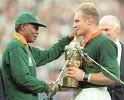Whatever you call it, one thing is undeniable: this game has power.
And I don’t just mean a physical kind of power; one that can cause the ball, from a perfectly-struck free kick, to spin and dip as it sails beyond the outstretched fingers of the goalkeeper, ducking beneath the crossbar and whipping the back of the net.
No, no. I’m talking about a kind of power that can change the world.
A game? Change the world? How can a game change the world?
Take a moment to watch this clip and you’ll see what I mean.
There may be no one who can better attest to the power of sport than the man who witnessed a game unite his horribly segregated nation in the mid-nineties.
 The man was Nelson Mandela, and the nation was the same one where 32 teams are now competing for soccer’s most coveted prize: South Africa.
The man was Nelson Mandela, and the nation was the same one where 32 teams are now competing for soccer’s most coveted prize: South Africa.Those who have seen the movie Invictus know just what I’m talking about. The story is worth repeating, but to avoid any spoilers, I’ll just give you the one-sentence synopsis: a divided nation became one as they rallied behind their national rugby team.
After witnessing this power first-hand, Mandela—who was also influential in South Africa’s bid to host the FIFA World Cup—said the following of the power of sport:
Sport has the power to change the world, the power to inspire, the power to unite people in a way that little else can. It speaks to people in a language they understand. Sport can create hope where there once was despair. It is an instrument for peace, even more powerful than governments in breaking down racial barriers.Sadly, the country of South Africa still struggles with segregation and racial tension today. Years of forced segregation (apartheid) have cemented certain beliefs in many of the country’s citizens. But if you’ve turned on the tube recently, you have seen white and black supporters standing side-by-side, cheering on their beloved Bafana Bafana.
A simple game is creating unity.
 Apart from South Africa’s racial problems, the continent of Africa, as a whole, is experiencing a multitude of crises. Poverty and disease make surviving each day a challenge, the aids pandemic continues to affect an extraordinary percentage of the population, and civil wars fought over race and religion have orphaned children, widowed mothers, and created soldiers of young boys. Yet I can only imagine that the six African nations represented at the World Cup have provided unspeakable relief from these daily discomforts.
Apart from South Africa’s racial problems, the continent of Africa, as a whole, is experiencing a multitude of crises. Poverty and disease make surviving each day a challenge, the aids pandemic continues to affect an extraordinary percentage of the population, and civil wars fought over race and religion have orphaned children, widowed mothers, and created soldiers of young boys. Yet I can only imagine that the six African nations represented at the World Cup have provided unspeakable relief from these daily discomforts.A simple game is creating hope.
No country on earth is without its problems. Yet even here in my hometown of Garner, NC, thousands of miles from the current soccer epicenter of South Africa, the game is resonating waves of change. Nightly, white, black, and Hispanic athletes leave their segregated neighborhoods to come to the most colorful place in town: the soccer field.
A simple game is making people look twice.
We have all witnessed the power of this game. But at the end of the day, it’s just that: a game. Football will never attain any supernatural status, and a soccer ball will never be anything more than leather and stitches inflated with air. The real power is within us all.
 So if something so simple as a game can build hope and create unity, break us from our stubbornness and hatred, and cause us to rethink our stances on social and racial issues, then maybe our differences aren’t as great as we all once thought.
So if something so simple as a game can build hope and create unity, break us from our stubbornness and hatred, and cause us to rethink our stances on social and racial issues, then maybe our differences aren’t as great as we all once thought.If you liked this blog, check out these links:
http://sportsillustrated.cnn.com/vault/2010/05/24/105940842/soccer-savior
http://www.nytimes.com/2010/06/02/world/africa/02soweto.html?ref=barry_bearak
http://www.beyondsport.org/download/hJBlairNV.PDF
